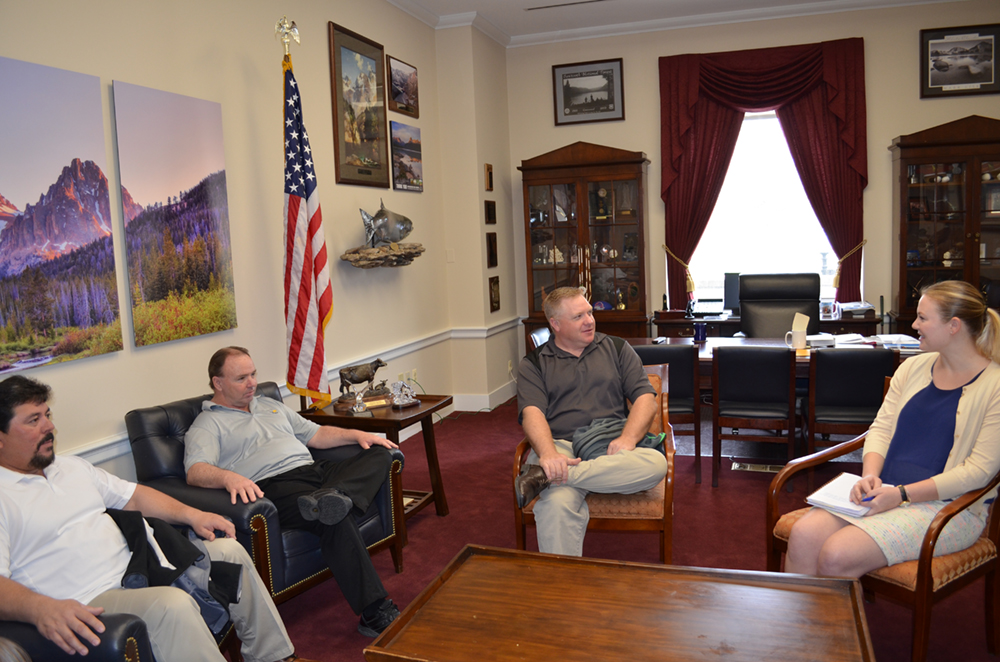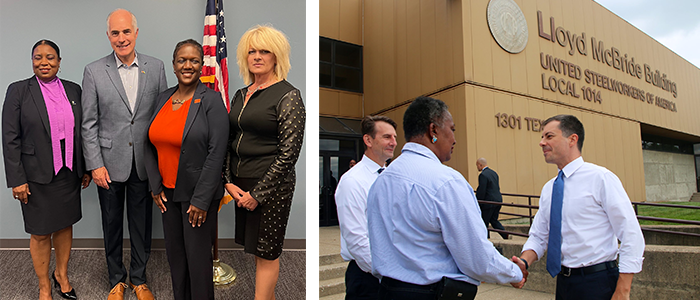USW Atomic Workers Fight in D.C. to Protect Paychecks, Jobs
USW members work tirelessly in Washington, D.C., because they know that their priorities like workplace health and safety, retirement security and even the right to organize all depend on having a voice in the nation’s capital.
For members in the atomic sector, there’s something even more basic on the line: their paychecks.

USW Atomic Energy Workers Council members lobby Congress on issues affecting their locals. Local 12-652 members from Idaho National Laboratory (L-R: Matt Chavez, president; Henry Littleford and Ryan Christiansen) talk to a staffer from Congressman Mike Simpson’s office. Photo: Mike Hancock, USW Local 9-562 retiree.
From the appropriations bill that sets the Department of Energy’s (DOE) budget, to the decisions the agency makes in how to spend that money, the union must fight to ensure members in the atomic sector are fairly compensated for their work.
Passing a budget
The first step in this process is securing funding for the DOE, and to do this Congress must pass a budget to fund the government.
Every year, USW legislative staffers discuss the funding needed for the union’s nuclear cleanup sites with House and Senate energy and water subcommittee appropriators and the House and Senate Appropriations Committees.
“The funding levels necessary to adequately perform decontamination and decommissioning work vary across the complex. For example, roughly $400 million is needed each year for the Portsmouth site, but some years require more funding,” said USW International Vice President Roxanne Brown, who heads the union’s atomic sector.
“This funding is crucial not only for the USW members doing this work, but for the surrounding community as well.”
Reaching a budget deal is a huge undertaking that requires agreement from both chambers of Congress. Currently, both the House and the Senate have agreed that they will not make the Sept. 30 deadline and have passed short-term spending bills to fund the government through Nov. 21. The DOE and its Office of Environmental Management (EM), which oversees cleanup of hazardous and radioactive waste, are covered under the energy and water appropriations bill.
The U.S. House of Representatives passed its version of the energy and water bill in June, which would keep EM funding flat at approximately $7.2 billion.
The Senate Appropriations Committee unanimously approved on Sept.12 its energy and water funding bill, which allotted $7.45 billion for the EM office.
Both versions are significantly more than the Trump administration’s budget request.
Once both houses of Congress pass all 12 appropriations bills, they go to a conference committee to iron out the differences between the House and Senate versions. The president will then need to sign the final budget.
If they cannot agree on a budget by the Nov. 21 deadline, they will need to pass another continuing resolution.
Lobbying Congress
Continuing resolutions are useful in keeping the government open, but there can be problems that require USW intervention, not only to keep paychecks coming but to save jobs.
For the past several years, Congress has passed continuing resolutions, some of which have included significant funding shortfalls.
“One year the funding shortfall for Portsmouth was $30 million, and it looked like there would be almost 300 layoffs at the plant before Christmas,” Brown said.
Brown, former USW International President Leo W. Gerard, and retired Vice President Carol Landry met with representatives from the Office of Management and Budget (OMB). This agency makes the final decision on the Federal Government’s budget.
They also asked the Local 689 president at Portsmouth to attend the meeting so that the government officials could understand the stakes involved for the local and its members.
After listening to how the funding decision affected Local 689 members, Ali Zaidi, then associate director for natural resources, energy and science at the OMB, decided to fund Portsmouth.
“That meeting never left me because it was so important to hear from the workers,” Brown said. “What resonates the most with policymakers is the people they don’t see — the people most impacted — and that is our members.”
By clicking Sign Up you're confirming that you agree with our Terms and Conditions.
Recent News Articles
Want to Learn More?
See how the USW is making a real difference in our communities and our workplaces.
